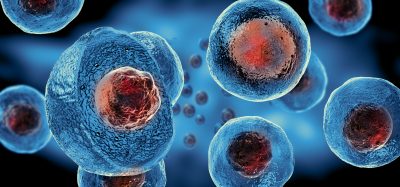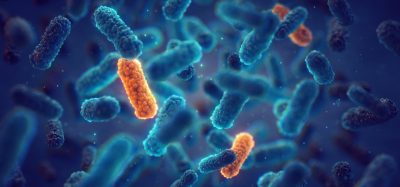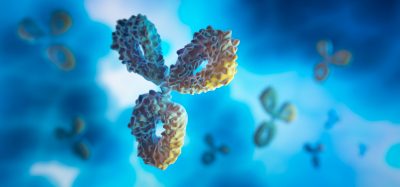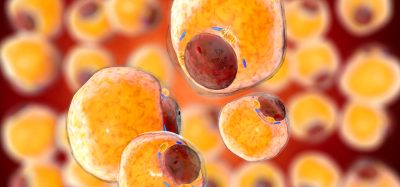Study identifies new therapeutic target for haematologic malignancies
Posted: 10 February 2022 | Ria Kakkad (Drug Target Review) | No comments yet
Using chemical genetic screening and pre-clinical model studies, researchers have discovered that inducing ubiquitin-mediated degradation of mutant EZH2 could provide a more effective treatment strategy for haematologic malignancies.
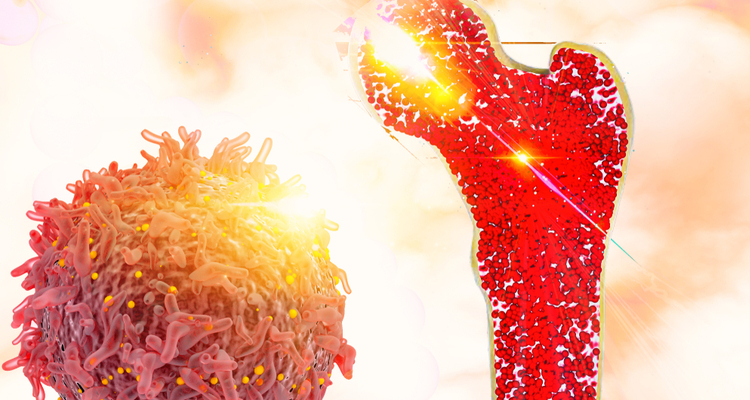

A study conducted at the Hefei Institutes of Physical Science of the Chinese Academy of Sciences has uncovered a new therapeutic target for haematologic malignancies, cancers that begin in the bone marrow where blood is produced.
Recently, the epigenetic regulator Enhancer of zeste homolog 2 (EZH2) has emerged as a critical target in both diffuse large B-cell lymphoma (DLBCL) and adult acute myeloid leukaemia (AML) due to its high frequency of mutations. However, secondary mutations and the enzymatic activity independent role of EZH2 has caused drug resistance post-long-term treatment. Therefore, destroying mutant EZH2 proteins may be more effective in targeting EZH2 mutant cancers and overriding drug resistance.
The study, published in Leukemia, utilised chemical genetic screening and pre-clinical model studies to reveal small molecule compounds that can induce ubiquitin-mediated degradation of mutant EZH2, leading to AML and DLBCL cell death in vitro and in vivo. Through extensive selective profiling, inhibition of Ubiquitin Specific Peptidase 47 (USP47) was identified by the researchers as a novel therapeutic target for haematologic malignancies bearing mutant oncoprotein EZH2. According to the team, USP47 is a novel deubiquitinating enzyme (DUB) that selectively stabilises mutant EZH2.
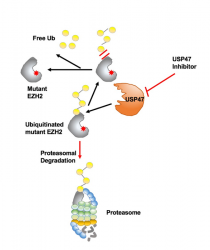

Proteasome-mediated degradation of mutant ezh2 proteins. Usp47 inhibitor treatment targeted oncogenic EZH2 protein degradation through activation of proteasomal-mediated degradation
[credit: Yang Jing].
USP47 is highly expressed in mutant EZH2-expressing cells, associates with and stabilises mutant EZH2 over wildtype EZH2. The researchers showed that inhibition of USP47 spares wildtype EZH2 in normal cells, thus circumventing the adverse side effects in clinical treatment.
The team also found that USP10 selectively targets FLT3-ITD and kinase inhibitor-resistant FLT3 mutants over wildtype FLT3 in AML and identified JOSD1 inhibitors that selectively target JAK2-V617F in AML.
“Therapeutic targeting of mutant EZH2 by promoting its degradation via DUB inhibition as opposed to inhibition of its enzymatic activity is an innovative approach that may help overcome resistance to current EZH2 enzymatic inhibitors,” said Yang Jie, first author of the study.
“Our findings provide potential benefits both avoiding adverse side effects associated with EZH2 inhibition in clinical use as well as overcoming the technical limitations associated with EZH2 kinase inhibition that reduce clinical efficacy,” said Ellen Weisberg, co-first author from Dana-Farber Cancer Institute of Harvard Medical School.
Related topics
Chemotherapy, Enzymes, In Vitro, In Vivo, Molecular Targets, Research & Development, Screening, Small Molecules, Target Validation, Targets, Therapeutics
Related conditions
acute myeloid leukaemia (AML), Chronic lymphocytic leukaemia (CLL), Chronic myeloid leukaemia (CML), haematologic malignancies, Leukaemia, Myeloma
Related organisations
Dana-Farber Cancer Institute of Harvard Medical School, Harvard Medical School, Hefei Institutes of Physical Science of the Chinese Academy of Sciences
Related people
Ellen Weisberg, Yang Jie



